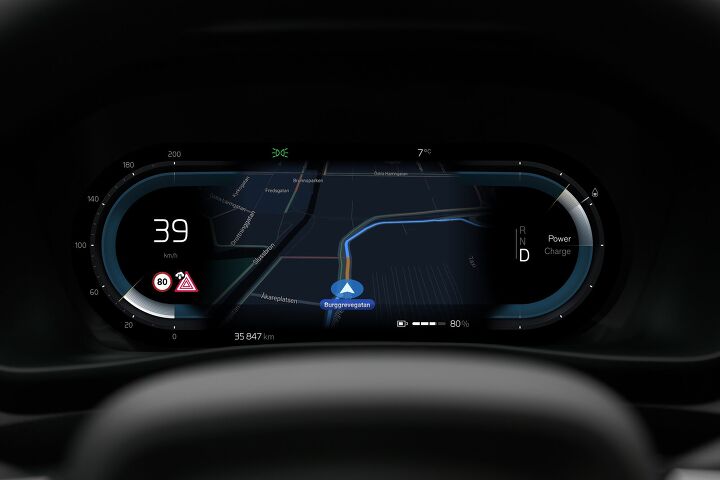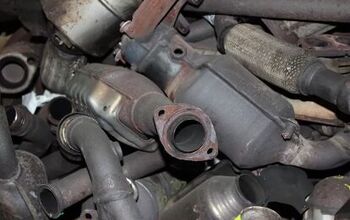Yay or Nay? Volvo Launches Accident Ahead Alert Service

Volvo is introducing a new feature that alerts drivers of accidents reported on the road ahead. With similar services available for free on select phone apps, many of which can be integrated with your vehicle’s infotainment display, Volvo’s offering doesn’t sound incredibly novel on its face. But it’s leveraging real-time data from government-operated traffic management centers via the automobile’s proprietary user interface, technically making the feature the first of its kind within the automotive industry.
Due to Volvo's Accident Ahead Alert service requiring the vehicle to communicate with a national traffic management hub, it’s presently only available in Denmark. However, the plan is to expand the feature to encompass the whole of Europe and incorporate additional data via partnering with the European Data for Road Safety ecosystem. This is in tandem with allowing connected Volvo products to communicate information with each other.
“We’re happy that Volvo Cars as the first car maker has started using our new real-time traffic event data feed,” Stine Bendsen, head of the Danish Traffic Management Centre at the Danish Road Directorate, said as part of the release. “A quick alert about an accident ahead gives the driver more time to slow down and increase the distance to the car in front. This helps to lower the risk of follow-up collisions and protect the people working to clear the road.”
This is very true. But we already have ways of doing this with arguably better accuracy. Most of the big tech companies have navigation applications that incorporate accident warnings that are usually submitted by other people that are currently traveling on the road. This would presumably offer more frequent data points than having to rely entirely on connected Volvos and government traffic hubs — depending on how the latter party monitors their roads.
In the event of a horrible wreck having taken place on a stretch of highway covered by loads of traffic cams, those traffic hubs are probably the first to know and likely to have more comprehensive details than any passerby. But it could be some time before the government is alerted to an accident on a less populated roadway and then manages to input the information that then has to be relayed to your car. Granted, it’ll still be happening quickly and digitally. But the same can be said of something like Waze, Google or Apple Maps.
Another big question is what else is Accident Ahead Alert going to offer? Many navigation applications will often warn drivers of impending speed traps, helping them avoid tickets. What are the odds those traffic enforcement centers are going to be telling Volvo where every police vehicle with a speed detector is going to be posted?
This is certainly a nice service to have. It’s just one that many of us have already. Likewise requiring cars to be networked to a government database is probably going to steer some people away from the brand. But most customers won’t be aware how the system works, let alone be bothered enough to give it a second thought.
Volvo hasn’t officially called this a pilot program. But rolling it out in Denmark makes it seem like that’s probably the case. Assuming the company manages how to work data transfer with government data hubs — the vehicle-to-vehicle communications are already figured out — for the Danes, it should scale up to encompass the whole of Europe. From there, the company will presumably see if it can begin service for other Western markets.
[Image: Volvo]
Become a TTAC insider. Get the latest news, features, TTAC takes, and everything else that gets to the truth about cars first by subscribing to our newsletter.

A staunch consumer advocate tracking industry trends and regulation. Before joining TTAC, Matt spent a decade working for marketing and research firms based in NYC. Clients included several of the world’s largest automakers, global tire brands, and aftermarket part suppliers. Dissatisfied with the corporate world and resentful of having to wear suits everyday, he pivoted to writing about cars. Since then, that man has become an ardent supporter of the right-to-repair movement, been interviewed on the auto industry by national radio broadcasts, driven more rental cars than anyone ever should, participated in amateur rallying events, and received the requisite minimum training as sanctioned by the SCCA. Handy with a wrench, Matt grew up surrounded by Detroit auto workers and managed to get a pizza delivery job before he was legally eligible. He later found himself driving box trucks through Manhattan, guaranteeing future sympathy for actual truckers. He continues to conduct research pertaining to the automotive sector as an independent contractor and has since moved back to his native Michigan, closer to where the cars are born. A contrarian, Matt claims to prefer understeer — stating that front and all-wheel drive vehicles cater best to his driving style.
More by Matt Posky
Latest Car Reviews
Read moreLatest Product Reviews
Read moreRecent Comments
- MaintenanceCosts There's not a lot of meat to this (or to an argument in the opposite direction) without some data comparing the respective frequency of "good" activations that prevent a collision and false alarms. The studies I see show between 25% and 40% reduction in rear-end crashes where AEB is installed, so we have one side of that equation, but there doesn't seem to be much if any data out there on the frequency of false activations, especially false activations that cause a collision.
- Zerocred Automatic emergency braking scared the hell out of me. I was coming up on a line of stopped cars that the Jeep (Grand Cherokee) thought was too fast and it blared out an incredibly loud warbling sound while applying the brakes. I had the car under control and wasn’t in danger of hitting anything. It was one of those ‘wtf just happened’ moments.I like adaptive cruise control, the backup camera and the warning about approaching emergency vehicles. I’m ambivalent about rear cross traffic alert and all the different tones if it thinks I’m too close to anything. I turned off lane keep assist, auto start-stop, emergency backup stop. The Jeep also has automatic parking (parallel and back in), which I’ve never used.
- MaintenanceCosts Mandatory speed limiters.Flame away - I'm well aware this is the most unpopular opinion on the internet - but the overwhelming majority of the driving population has not proven itself even close to capable of managing unlimited vehicles, and it's time to start dealing with it.Three important mitigations have to be in place:(1) They give 10 mph grace on non-limited-access roads and 15-20 on limited-access roads. The goal is not exact compliance but stopping extreme speeding.(2) They work entirely locally, except for downloading speed limit data for large map segments (too large to identify with any precision where the driver is). Neither location nor speed data is ever uploaded.(3) They don't enforce on private property, only on public roadways. Race your track cars to your heart's content.
- GIJOOOE Anyone who thinks that sleazbag used car dealers no longer exist in America has obviously never been in the military. Doesn’t matter what branch nor assigned duty station, just drive within a few miles of a military base and you’ll see more sleazbags selling used cars than you can imagine. So glad I never fell for their scams, but there are literally tens of thousands of soldiers/sailors/Marines/airmen who have been sold a pos car on a 25% interest rate.
- 28-Cars-Later What happened to the $1.1 million pounds?I saw an interview once I believe with Salvatore "the Bull" Gravano (but it may have been someone else) where he was asked what happened to all the money while he was imprisoned. Whomever it was blurted out something to the effect of "oh you keep the money, the Feds are just trying to put you away". Not up on criminal justice but AFAIK the FBI will seize money as part of an arrest/investigation but it seems they don't take you to the cleaners when they know you're a mobster (or maybe as part of becoming a rat they turn a blind eye?). I could really see this, because whatever agency comes after it has to build a case and then presumably fight defense counsel and it might not be worth it. I wonder if that's the case here?


































Comments
Join the conversation
Good for the Danes.
So Waze but less